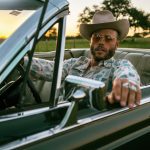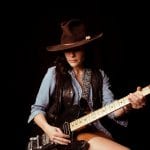Waylon Jennings: Sex, Drugs, & Rockabilly-Part 6/The End.
“WAS IT SINGING THROUGH MY NOSE THAT GOT ME BUSTED…?”
Tuesday evening, August 23, 1977 was just another summer night in Nashville–hot and humid. A few employees were still at the offices at Seventeenth and Edgehill. Waylon was next door at American Studios, helping put some finishing touches on a new Hank Junior album.
Braniff Airlines, Flight 119 arrived in Nashville at 7:40 PM. Waylon’s secretary, Lori Evans was at the airport to pick up a package shipped from New York-Kennedy by Reshen’s assistant, Mark Rothbaum.
Lori was followed back to Waylon’s office by DEA Special Agent Bernie Redd and several fellow narcs. They became confused when Lori did not enter Waylon’s building and walked instead to American Studios. Armed with a search warrant for Waylon’s offices, the feds could only enter American Studios and detain their suspects—no search was legal.
While he covered the studio and radioed for an additional search warrant, Agent Redd sent his men into Waylon’s offices. I was working on a summer press release when the sight of a male stranger in the hallway caught my eye. For whatever reason, this man wearing a necktie stopped and asked me, “Have you seen Agent Newman?” Before I could say no, he moved on down the hall. Booking agent, George Laibe, was in the office next to mine. I alerted him to the intruders and he made a beeline to American Studios.
He found drummer Richie and Hank Junior in the control booth with Agent Redd and his two sidekicks. Waylon was in the studio, seated behind a microphone. George was a big man, a pot smoker, and prone to theatrics. He asked Richie who were these strangers and their cohorts next door. Richie pressed a talk-back button so Waylon could hear. “These guys are D.E.A., looking for drugs shipped from New York. They’re waiting for a warrant to search the studio, and we’re going to keep working ’til it gets here. Now, I need to adjust Waylon’s mike.”
Richie gave George a quick wink, then walked into the studio while George began a mild rant that kept the feds’ attention. Richie whispered to Waylon, “Where is it?” Waylon gave a slight nod toward a concealed space where he had tossed the evidence.
The next sound the narcs heard was the flushing of a nearby toilet. A look of “Oh shit!” crossed their faces simultaneously. Richie was pretending to zip his jeans, and blocking entry to the bathroom. The first agent to the toilet was able to reach in and grab some wet shreds of the New York Times. The coke was in Nashville’s sewer system.
When the warrant arrived, Waylon was arrested and charged with “conspiring to possess and possessing with intent to distribute cocaine.” Each charge carried a maximum fifteen years in prison and fifteen-thousand-dollar fine.
Twelve hours later, Waylon and Willie were singing to a sold-out crowd at Nashville’s Municipal Auditorium. When Waylon took the stage to join Willie in “Luckenbach, Texas,” he received a standing ovation and shouted to the crowd, “I didn’t do it!”
The bust was front-page news in the next day’s Nashville Banner: “Waylon Faces Federal Cocaine Charge.” He had no statement for the press, but allowed me as his publicist to make a personal comment for the local news. I said, “I don’t believe they busted Waylon Jennings. He’s innocent of the charges and they will have a hard time making a case against him. The outlaw image is a record label marketing tool. Waylon has never been in trouble and charging him with intent to distribute is ridiculous. The man earns fifteen thousand dollars a show. He doesn’t need to deal dope.”
It cost Waylon about a hundred grand in legal fees. His attorney, Jay Goldberg, managed to shoot enough holes in the case to cause the charges to be dropped after six weeks, without prejudice, which meant if the prosecution later found cause, they could reopen the case. Prosecutor Hal Hardin ultimately stated, “He does drugs, but he’s not a criminal.” For Waylon Jennings, snorting a line and walking the line had developed a new set of rules.
He did intend to possess, and he often distributed—shared with his pals at no charge, but he sure as hell was not a dealer. Determined to see someone do time, the feds brought charges against Reshen’s assistant, Mark Rothbaum. Reshen was in the middle of a nasty divorce, and Waylon wondered if the soon-to-be ex-Mrs. Reshen had tipped the narcs. Twenty-seven of the twenty-eight grams Rothbaum shipped to Waylon were intercepted and held by New York authorities. Convicted in May of 1978, Rothbaum served eighteen months in a minimum security pen for sending dope to Waylon. The brief negative press generated by the bust, with Rothbaum caught in the middle, caused Waylon considerable stress.
More stressful was figuring how to continue his illegal habit with an open drug case hanging over his head. Fellow outlaw Willie Nelson, several years split with Reshen, was disgusted by young Rothbaum taking the rap. Willie stayed in touch with Rothbaum and when he completed his sentence, hired him as a business manager.
Coincidentally, or not, one week before Waylon was busted, Elvis died in Memphis from an overdose, The King and the Outlaw were well acquainted and had crossed paths several times since 1955 when Elvis opened a Pontiac dealership in Lubbock. Waylon remembered the last time he saw Elvis. They were at the Hilton in Las Vegas. Elvis sent two of his bodyguards to invite Waylon and Jessi up to his suite. Elvis’s pal, Sonny West, was playing with a handgun and pointed it at Jessi. Waylon warned him, “Hoss, if you point that thing at my wife again, you better grease it up, cause I’m gonna stick it up your ass.” Elvis laughed and Sonny put the gun down.
CURTAINS/ LIFE AFTER WAYLON
One day at his Nashville home, Waylon walked in on Shooter, his three-year-old son, holding a cut-off straw to a nostril, pretending to be like daddy. The forty-seven-year-old outlaw knew he had to kick his all-consuming habit, but even then, two years passed before he could summon the courage.
In April of 1984, on a small ranch outside of Phoenix, with Jessi by his side, Waylon began thirty days of self-imposed detox. After eight years on pills and another twelve with cocaine added to the mix, Waylon beat his addiction. He later acknowledged it took eight more years to get over missing the highs: “I was so addicted, I would get up in the middle of a sound sleep at three A.M. to do a toot.”
In 1988, he began to suffer chest pains which lasted through two years of denial before he went in for a quadruple by-pass. When he wrote his autobiography in 1996 at age fifty-nine, he was already on Metformin for diabetes. Five years later, the disease was out of control. A foot was amputated in December, 2001, and six weeks later, February 13, 2002, Waylon died in his sleep at age sixty-four. His one best friend, Johnny Cash, died less than two years later, also from diabetes complications.
Before he left this life, Waylon had this to say, “I’d like to be remembered for my music, not necessarily what people see when they see me, but what they feel when they talk about me. Some people have their music. My music has me.”
EPILOGUE
Jessi continues to live near Phoenix where she first met Waylon. Buddy Holly’s motorcycle, a 1958 Ariel Cyclone which was given to Waylon as a forty-second birthday present, is parked inside the house.
Waylon’s drummer and longtime friend, Richie Albright is over seventy, living outside Nashville in Franklin, and still drumming.
We never did write that book, Waylon and me. The one he penned twenty years later with Lenny Kaye, “Waylon: An Autobiography” delivers the candor he described to me in 1977: “I want to tell the truth. I don’t want to write that sugar-coated shit like Cash wrote.” He was referring to one of Cash’s earlier biographies which omitted details of drug use and night life. Waylon mused to me, “If I write it now, I’ll probably get arrested or Jessi will kill me.”
My last days with Waylon were clouded by the bust and the financial crisis Reshen had delivered. Two female accountants were moved into the office building and given control of everything related to the business. This was to appease the IRS which had threatened to lock us out of the building. Waylon and Richie both avoided the office. The show was over and my work was done. I gave two weeks notice via booking agent George, and was gone as quietly as I had arrived.
The last time I visited with Waylon in person was thirteen years later. He was in my hometown, Jacksonville, Florida to open a wrestling match at the Gator Bowl. With Jessi by his side, he invited me, my wife and our two young children aboard his bus. Before we shook hands for the last time, he asked me to “Look out for Julie.” his daughter who was living nearby with a friend of mine.
Three Waylon tribute albums were released ten years after his death. Buddy Holly would have turned 75 in 2011. Fans around the world are glad Ol’ Waylon didn’t just quit when “the music died” with Buddy in 1959.
Bill Conrad lives and writes in Jacksonville, Florida.
READ THE OTHER PARTS OF THIS SERIES HERE:
PART 1
PART 2
PART 3
PART 4
PART 5
PART 6




